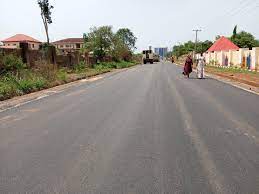The Federal Government of Nigeria has supported concrete road technology to revamp Nigeria’s infrastructure. According to statements made by David Umahi, Minister of Works of Nigeria, President Bola Tinubu is interested in and fully supports the utilization of concrete technology in the construction of roads in the country.
During a meeting with contractors who handle projects in Nigeria’s North East Geopolitical Zone, the Minister shared this information with them.
Contractors that refuse to employ concrete in road construction would be required to post a performance bond, which he mentioned when explaining the rationale behind his decision to use concrete technology.
“We are introducing concrete road technology, and some of you are not happy about it. Some are saying it is too expensive, but we have to try the both and see which is better. In any case, any contractor with an ongoing project that is not willing to cooperate with us for a redesign with concrete road technology, which is fifty years period free of maintenance, we’ll demand for performance bond.”
“The situation and time when roads are built on asphalt and within two to three years the project is back to square one is gone. We don’t witness this kind of construction pattern in developed countries. You came from developed countries, so we are going to respect Engineering Best Practices in Nigeria. We will build a road that is going to last,” he said.
Read also: Tinubu seeks Nigerian technologists for important positions
The displeasure of the Ministry
The Minister went on to express his disgust with road construction contractors that drag out projects for up to 20 years, adding that contractors should not be allowed to be on-site for longer than 4 years.
Also, referring to his recent meeting with contractors working on dual highways, he mentioned that the contractors were instructed to finish at least one lane of the road.
“I had recently met with contractors handling road dualization projects, and my position on the issue is to take one lane and complete it because of paucity of fund, but with the availability of money, they could start the second lane. We can manage with one lane instead of not having anything at all,” he said.
Mr. Umahi further stated the reasons for the collapse of the road, which include, among other things, poor craftsmanship from the contractors, the introduction of contaminated bitumen into the country, and the paving of asphalt with a thickness that was less than what was considered correct.
He placed a strong emphasis on the necessity of these issues being rectified in order to develop runways that are more durable across the country.
Termination of road projects
The Nigerian government has stated that in order to fill the financial shortfall for inherited abandoned road projects with a total value of N6 trillion, it may be necessary to cancel the projects that have been ongoing for ten to twenty years.
The majority of the initiatives, according to the government, do not have a clear financial source.
Following his meeting with President Bola Tinubu at the Presidential Villa in Abuja, the Minister of Works, David Umahi, made these revelations while updating state house media on the situation.
In addition, the government stated that it would consult with members of the National Assembly in order to set priorities for road construction and put an end to the unhealthy appropriation of road infrastructure.
In addition to this, Umahi disclosed that the Federal Ministry of Works, under the current administration, has inherited a total of 2,604 projects with a value of N14 trillion for 18,000 km.
He went on to say that from the time he became Minister of Works till the present, a total of N4 trillion had been paid out, but an outstanding balance of N10 trillion remained.
